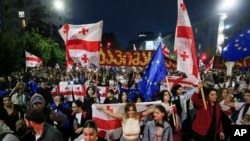Fresh flowers lie at the feet of an outsized statue of Josef Stalin. His mustachioed face overlooks the wide, marble entrance hall of the museum in the city of Gori, Georgia dedicated to the life of the Soviet dictator. Groups of tourists — a mixture of Western, Russian and Chinese — jostle for position to take perfect selfie photographs alongside the pallid carving.
Stalin was born in Gori in 1878. The city still celebrates its local hero. The vast museum — built in 1957, four years after his death — encapsulates Georgia’s struggle to reconcile a contested and turbulent twentieth-century history, as the country tries to forge a new future aligned to the West.
Stalin shrine
The museum appears to have changed little over the past seven decades. One of the most popular displays recreates Stalin’s office in the Kremlin, complete with original furniture and telephone. Canvases depict him holding aloft smiling children or holding Soviet committees in rapt attention with apparent oratorical flair. The gift store at the exit sells Stalin-branded wine, cigarette lighters bearing his beaming face, or mini bronze-cast busts.
One of the most jarring displays shows Stalin’s death mask on a spotlit plinth in the middle of a temple-like, circular atrium. It feels more like a shrine than a museum.
Stalin is lauded for helping to lead the Soviet victory over Nazi Germany. He is also blamed for the deaths of an estimated 30 million people.
A small room under the stairs — added only in 2010 — sketches over Stalin’s crimes: the gulag prison camps, the forced famines, the killing of millions of citizens, including Georgians.
Russian occupation
Seventy-one years after Stalin’s death, Russia is still trying to exert power over the former Soviet republic.
A few kilometers north of Gori lies the Russian occupation line. Its troops still occupy 20 percent of Georgian territory after the civil war in the early 1990s and the Russian invasion of 2008, when Moscow’s troops briefly occupied the city before retreating toward the mountains.
The Russian troops still pose a danger for residents. “The key is to avoid crossing the occupation line. If you cross it, you will be detained,” local farmer Gela Bolatashvili told VOA.
Those past and present troubles form the backdrop for Georgia’s current political turmoil, as its people prepare for a crucial election in October. The government is led by the ‘Georgian Dream’ party, founded and backed by the oligarch Bidzina Ivanishvili, who made billions of dollars in the chaos of 1990s post-Soviet Russia.
Critics accuse Ivanishvili and his party of turning away from Georgia’s constitutionally stated aim of joining the European Union and seeking to rekindle ties with Moscow. The party denies this, and insists it wants to join the EU by 2030.
Nevertheless, a stream of anti-Western government propaganda is accompanied by warnings that the United States and NATO are seeking to drag Georgia into Russia’s war on Ukraine. A recent ‘foreign agent’ law is widely seen as an attempt to silence critical Western-funded nongovernmental organizations and independent media ahead of the election, prompting Washington to impose sanctions earlier this month on some Georgian Dream MPs.
Recent polls suggest more than 80 percent of Georgians are in favor of joining the EU – and it’s likely to be a key issue in the lead up to October’s poll.
EU hopes
East from Gori, along the foothills of the Caucasus mountains, an ancient industry is hoping for a new future inside the EU. Archaeological evidence suggests wine has been made in Georgia’s Kakheti region for around 8,000 years, longer than anywhere else in the world, earning it the moniker ‘the birthplace of wine.’
The Nekresi wine estate makes 50,000 bottles a year for domestic and international markets, including the United States, France and South Korea. It aims to increase production to 250,000 bottles in the coming years.
“We are targeting foreign markets, particularly in Europe, to sell our products,” said Nara Silagadze, the manager of the Nekresi estate. “Georgia’s potential European Union membership would be a significant advancement for our business,” she told VOA.
The EU has invested over $2 billion of public and private money in Georgia under its ‘Global Gateway’ strategy. The bloc says the investment is aimed at strengthening “digital, energy, and transport connections in Georgia and between Georgia and the EU” and supporting small and medium-sized businesses.
Nekresi wine estate is among those to benefit.
“Until now, we have relied on our own resources. But as we have grown, we have acquired additional support. EU funds have provided this assistance. The hotel we are constructing is energy-efficient and the EU has decided to collaborate with us and support its development,” Silagadze said.
Geopolitical tensions
Both Europe and the United States have invested heavily in Georgia’s economy and democracy since it gained independence following the collapse of the Soviet Union. Amid renewed geopolitical tensions between east and west, the country’s political path is under renewed focus.
As the crucial October election approaches, Georgians are caught between contested histories and future hopes, overshadowed by a propaganda-fueled fear of renewed conflict.



